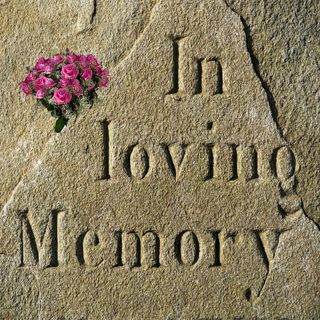Fear
Writing a Creative Eulogy for Your Beloved
Writing a eulogy may not be as difficult as you think.
Posted May 21, 2018 Reviewed by Abigail Fagan

Over the past few years, I’ve written more eulogies and given more tributes than I have in my entire lifetime. When delivering a eulogy I’ve written or hearing a eulogy at someone else's memorial, I can't help but think about how our loved ones would have enjoyed hearing how they impacted us. Sometimes we have no idea how much we are loved. Attending memorials reminds me of the importance of expressing gratitude more often to those who are meaningful to us. These gatherings also help us heal, as the attendees share emotional, spiritual, and practical sentiments and advice.
There are two writing prompts that I frequently offer in my writing workshops, which the participants seem to enjoy. The first is to write one’s own eulogy, and the second is to write a letter to a loved one who has passed away. These are wonderful ways to honor those who have influenced us during our lives.
As former vice president Joe Biden says in his beautiful book Promise Me, Dad, “Funerals are for the living, I have always believed, and the job of the eulogist is to acknowledge the enormity of the loss they have just suffered and to help them appreciate that the legacy and accomplishments of their loved one have not died with them” (p. 43).
It goes without saying that in order to write a creative eulogy, you first need to feel a deep sense of love and loss for the person who has passed. Three of the most creative eulogies I’ve written were for my father-in-law and two friends.
Here are some of my eulogy excerpts:
To Alex: Fear was not a word in Alex’s vocabulary—either in the face of all his losses, including his siblings, the Nazis, cancer, stroke, Parkinson’s, and finally, his death. When I faced my own health challenges, Alex continually told me, “Diana, have no fear.” As a man who loved giving advice, what he would say to all of us now would be, “Celebrate my life. Have no fear. Follow your dreams. Make waves. Make money. Be honest and follow your intuition.”
To Thom: It’s not easy crafting a eulogy about a wonderful man who never thought he amounted to much, nor would he think he’d be worthy of this celebration. He always felt as if he stood in the shadow of his father, John Steinbeck. Thom was a renaissance man and raconteur with an interest in the arts and sciences. He was an artist, veteran, journalist, helicopter pilot, sailor, model-ship maker, Barbie repairman, bonsai expert, tequila aficionado, limerick lover, Yorkshire-pudding expert, lamb-burger adorer, and Zen pet whisperer. If you met Thom, you could not help but remember his enthusiastic and charismatic ways; his interest in everyone’s passions; his deep disdain for injustice; and that deep, sonorous voice. I will always miss his friendship, adoration, storytelling, sense of humor, and words of wisdom. In so many ways, he is still with us, as a man of greatness should always be. Amen.
To Phil: When I received the text that Phil had passed away, I was on the plane from my home in California to Fort Lauderdale to await the birth of my third grandchild. For the entire flight, my eyes filled with tears, and all I could think of were Phil’s words: “When it hurts, write harder,” which for years had been posted on a sticky note above my computer. I believed in those words, but on this flight, my pen became paralyzed. I couldn’t write. I was in too much shock. How could Phil be gone? When I visited him last year, I knew it would be the last time I’d see him. And now, perhaps he’s resting peacefully, and once again rereading one of his favorite books, Anna Karenina.
Here are some suggestions for writing a creative eulogy:
- Start by making a list of special moments and memories.
- Consider the tone for your eulogy/tribute.
- Begin by saying who you are and how you knew the person.
- Share your most poignant experiences or memories.
- Consider the other speakers, and try to offer a different perspective.
- End with some of this person’s words of wisdom.
There are a number of great reference books in case you want to include a poem in your tribute. I highly recommend Poems and Readings for Funerals and Memorials, compiled by Luisa Moncada.
The best eulogies are written after death and before the memorial, because they tend to be more organized. When grieving, it’s sometimes difficult to remain focused, so having the words in front of you will make it easier to speak. Spontaneity is not always possible at these moments.
It’s best to write the eulogy, and then if you have time, let it sit for a day or so and then reread it. Try to read it aloud in front of a mirror. Consider asking others to read it to get their thoughts about how you’re portraying the person.
References
Biden, J. (2017). Promise Me, Dad: A year of hope, hardship, and purpose. New York, NY: Flatiron Books.
Moncada, L, Ed. (2009). Poems and Readings for Funerals and Memorials. London, UK: New Holland.
Rinpoche, S. (2002). The Tibetan Book of Living and Dying. New York, NY: HarperOne.


